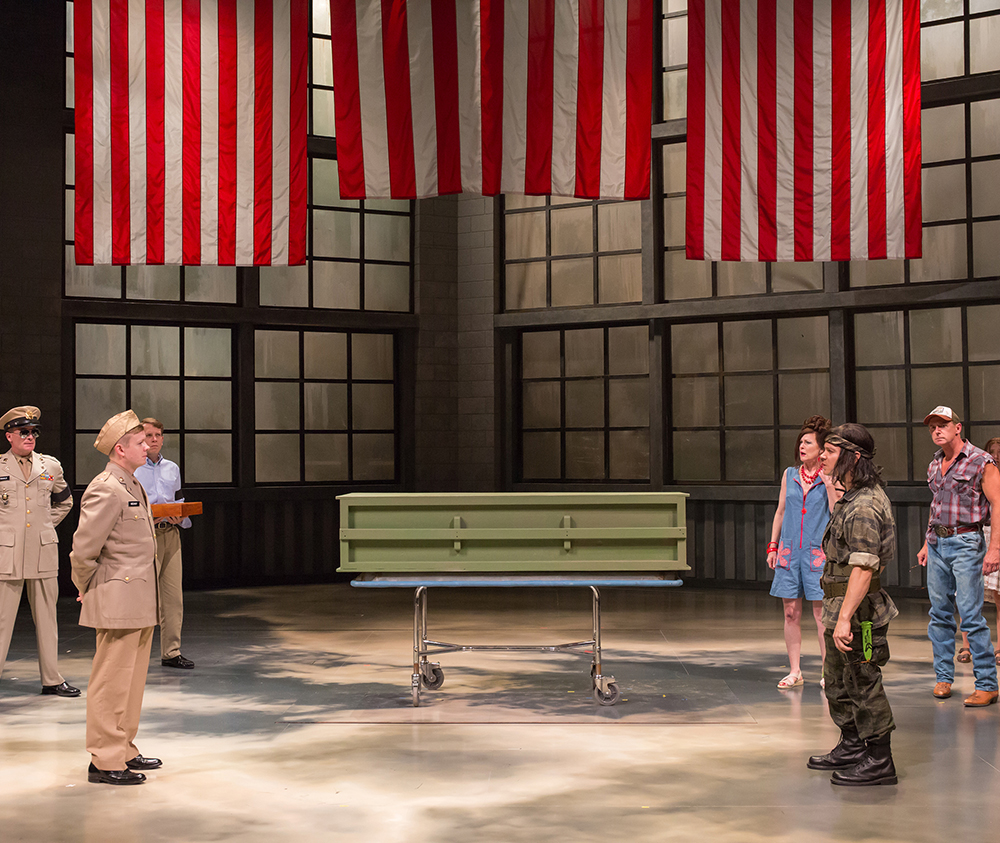Watching History in A PRAYER FOR OWEN MEANY
Jun 15, 2017

Based on John Irving’s classic novel, A Prayer for Owen Meany tells a fictional story within a realistic setting. Historical references to 1950s and ‘60s American politics, war and pop culture create a familiar world, providing rich context for the story and enhancing our understanding of its unique characters.
“The story begins in the ’50s and takes you into the Vietnam era — a time of turmoil and doubt,” explains Artistic Director Blake Robison, who directs the production. “John Wheelwright, Owen’s childhood best friend, tells us the story from his perspective as an ex-pat living in Canada in the 1980s — estranged from his country and himself during the Reagan years. We experience the story from our own vantage point in 2016.”
Many of the historic references in the play help the audience understand what Robison refers to as “The World According to Owen.” These are the references that help illuminate Owen’s character — they make us believe that his moral, political and religious convictions are so strong that he could genuinely believe in his own divine purpose and pursue it against all odds.
When Owen enlists, defends Liberace, grapples with the moral choices of President Kennedy and imagines himself as Lenny Bruce, we get a more textured glimpse of the characteristics that he values most – underlining his belief in pacifism, his selflessness and his strong moral code.
“There’s something about Owen’s certainty of purpose and his profound faith that resonate even more amid all of the noise,” continues Robison. “He’s suspicious of institutions and skeptical of authority. And yet, Owen is sensitive and generous. He has a big heart, and he makes an extraordinary sacrifice for the greater good.”
To learn more about the Playhouse production of A Prayer for Owen Meany, visit the production detail page.
“The story begins in the ’50s and takes you into the Vietnam era — a time of turmoil and doubt,” explains Artistic Director Blake Robison, who directs the production. “John Wheelwright, Owen’s childhood best friend, tells us the story from his perspective as an ex-pat living in Canada in the 1980s — estranged from his country and himself during the Reagan years. We experience the story from our own vantage point in 2016.”
Many of the historic references in the play help the audience understand what Robison refers to as “The World According to Owen.” These are the references that help illuminate Owen’s character — they make us believe that his moral, political and religious convictions are so strong that he could genuinely believe in his own divine purpose and pursue it against all odds.
Vietnam War
Even the earliest of John’s memories are colored by the war. When he looks back on his youth, he recalls it as a time before people had even heard of Vietnam and when draft cards meant nothing. As we follow John’s memories, we witness the war become a part of daily life. Avoiding the draft becomes a common topic of discussion, Owen enlists in the army and a young man whose brother died in the war bad-mouths the Vietnamese. The historical references to the Vietnam War are inherently intertwined in the plot and play a role in several memories John visits throughout the play, providing a realistic, tangible backdrop for Owen’s tale.Liberace
Owen and John’s grandmother share a love for cultural icon and pianist Liberace. When John questions their interest in the performer, bringing up his flamboyant apparel and showmanship, Owen defends Liberace. He says that Liberace would never hurt anyone and notes that “he gave his brother a job, and he’s not especially talented.” Mrs. Wheelwright also cites that Liberace publicly declared his opposition to homosexuality from the witness stand, giving the discussion historical irony for John as a narrator from the future.President Kennedy and Marilyn Monroe
President Kennedy’s alleged affair with Marilyn Monroe is referenced as Owen and a classmate’s mother argue about the validity of the shocking accusations. Their conversation turns into a discussion about the moral principles of affairs, and Owen declares that he would never have an affair if he were the president and married, even with Marilyn Monroe. A hot topic for gossip during the Kennedy administration, the affair was never confirmed. But Owen tells John that he won’t propagate the rumor because he can’t imagine what would happen to Kennedy if such a scandal leaked to the newspapers.Lenny Bruce
Late in the play, Owen appears as Lenny Bruce, impersonating the late comedian’s brash, iconic voice to express his own blunt angst about the state of the country and his fears about the future. Owen is straightforward with his thoughts and beliefs throughout the show, but this imitation gives him the chance to shed any sense of propriety and fully express to the audience his raw emotions without consequence. Owen specifically channels the first comedian to use obscene language in comedy — Lenny Bruce invoked his freedom of speech in a way no one else had, and he paved the way for the empowered, politically charged comedians of today.When Owen enlists, defends Liberace, grapples with the moral choices of President Kennedy and imagines himself as Lenny Bruce, we get a more textured glimpse of the characteristics that he values most – underlining his belief in pacifism, his selflessness and his strong moral code.
“There’s something about Owen’s certainty of purpose and his profound faith that resonate even more amid all of the noise,” continues Robison. “He’s suspicious of institutions and skeptical of authority. And yet, Owen is sensitive and generous. He has a big heart, and he makes an extraordinary sacrifice for the greater good.”
To learn more about the Playhouse production of A Prayer for Owen Meany, visit the production detail page.